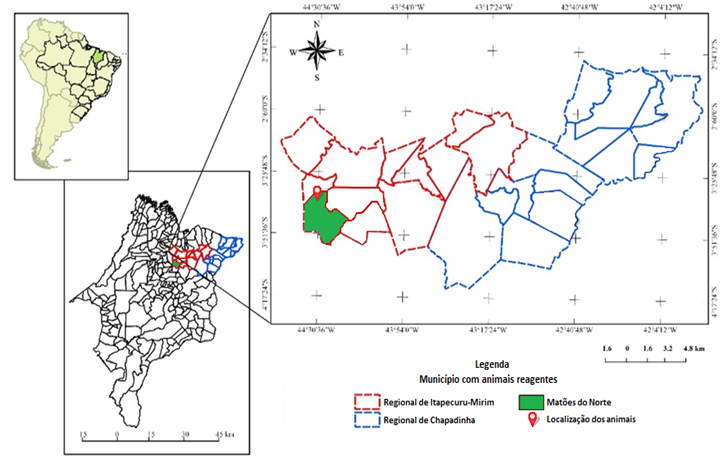Serological evidence and spatial analysis of small ruminant lentiviruses in herds in Maranhão, Brazil
DOI:
https://doi.org/10.21708/avb.2020.14.4.9001Abstract
Caprine arthritis encephalitis and Maedi-Visna are lentiviruses affecting goats and sheep, respectively. Despite the literature having studies about these diseases, there is a constant demand and the need to study the health status of flocks that exploit economically. Therefore, this study aimed to assess the frequency of small ruminant lentiviruses explored in regional locations of Chapadinha and Itapecuru Mirim, that compose the microregion of Low Parnaíba, Maranhão, Brazil, as well as analyze the spatial distribution of outbreaks in the studied regions. Therefore, 241 properties were visited, where blood was collected in 1150 sheep and 1260 goats and tested by agar gel immunodiffusion (AGID). Epidemiological questionnaire was applied and collected the geographic coordinates. There was a low frequency for lentivirus, with 0.39% (5/1260) of goats and 0.08% (1/1150) of sheep. Regarding the spatial analysis, the reagent flocks were distributed in strategic cities for commercialization throughout the microregion. There was a low occurrence of lentiviruses. The municipalities of Cantanhede and Pirapemas of the regional of Itapecuru Mirim and Brejo and Magalhães de Almeida had reagent flocks for CAE. Whereas the municipality of Matões do Norte presented flock reagent to Maedi-Visna, this belonging to the regional of Chapadinha.
Downloads

Downloads
Published
Issue
Section
License
Autores que publicam na Acta Veterinaria Brasilica concordam com os seguintes termos: a) Autores mantém os direitos autorais e concedem à revista o direito de primeira publicação, com o trabalho simultaneamente licenciado sob a Licença Creative Commons Attribution que permite o compartilhamento do trabalho com reconhecimento da autoria e publicação inicial nesta revista. b) Autores têm autorização para assumir contratos adicionais separadamente, para distribuição não-exclusiva da versão do trabalho publicada nesta revista (ex.: publicar em repositório institucional ou como capítulo de livro), com reconhecimento de autoria e publicação inicial nesta revista. c) Autores têm permissão e são estimulados a publicar e distribuir seu trabalho online (ex.: em repositórios institucionais ou na sua página pessoal) a qualquer ponto antes ou durante o processo editorial, já que isso pode gerar alterações produtivas, bem como aumentar o impacto e a citação do trabalho publicado (Veja O Efeito do Acesso Livre).


 Esta obra está licenciada com uma Licença
Esta obra está licenciada com uma Licença 